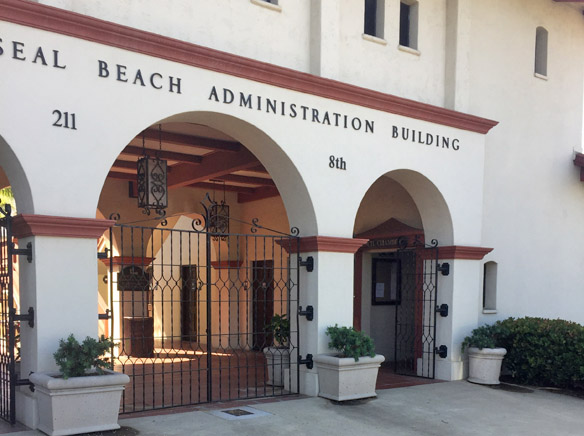A portion of the city’s revenue losses caused by COVID-19 restrictions will be absorbed by the budgeted surplus, according to Finance Director/Treasurer Kelly Telford.
As of Monday, May 11, staff was estimating a revenue decline of about $2.3 million for the current financial year. However, Telford said Seal Beach was fortunate in that there was a $1.4 million surplus budgeted in the 2019-2020 budget. (The numbers have been rounded.) She also said city staff was already achieving a significant amount of budget savings.
During her presentation, Telford cautioned against focusing too much on specific numbers from current estimates of COVID-19’s impact on the budget. She also told the council that the budget had been revised four times (as of the May 11 meeting) and that information changed about every 10 days.
Telford pointed out that this was not a normal recession and that this was the first time the entire city was shut down.
Telford said the presentation was based on some key assumptions: that the governor’s stay-at-home order will be lifted by June 1 and that the virus runs its course by Oct. 1.
The real unknown at this time: “How will people respond when the stay-at-home orders are lifted?” Telford asked.
“Will they resume the normal activates that will directly impact our revenue stream?” Telford asked.
It could take 12 to 24 months until a vaccine is developed, Telford said.
“It could take time for people to feel comfortable to return to restaurants, shopping centers and city facilities,” Telford said.
According to Telford, it could be two to three years before state and local revenues return to the levels before COVID-19.
Cost and reimbursements
Telford’s slide presentation showed that the pandemic response had cost Seal Beach $260,000 as of May 8.
“FEMA will reimburse 75% of eligible costs,” Telford said.
According to Telford, the Federal Emergency Management Agency provides the only source of reimbursement to local governments.
Telford said Orange County cities have asked the county executive officer to request that the Orange County Board of Supervisors reimburse cities for the remaining 25% not covered by the county.
(On Tuesday, May 12, the Orange County Board of Suprvisors voted 3-2 to defeat a motion by Supervisor Michelle Steel, of Seal Beach, and Supervisor Donald P. Wagner “to direct $75 million of CARES Act Funding to Assist Business Recovery Grant Program to be administered and divided amongst the cities,” according to a statement issued by Supervisor Steel’s office.)
During her Monday presentation, Telford pointed out that the federal CARES Act provides funding for cities with populations of 500,000 or more individuals.
During his presentation to the City Council, Police Chief Phil Gonshak pointed out that Orange County has no cities with populations of that size.
A range of possibilities
During the presentation, she also said that it was impossible to give an accurate projection of where Seal Beach will be.
She presented the council with what she described as “a range of possibilities.”
Based on what she was seeing, Telford said Seal Beach would end up being in the middle of the numbers. Her slide presentation included estimated revenue based on the assumption that the pandemic would have a moderate impact on Seal Beach’s income and the estimated revenue assuming a significant impact. She believed some revenue streams would experience a moderate economic impact and others a severe impact. She said property taxes were only expected to decline slightly. “The assessments for property taxes have already been levied,” Telford said.
She said the city did not expect to see the impact on property taxes until 2021-2022. Telford said the city would not have more information on property taxes until later this fall.
Savings
As mentioned at the beginning of this article, Telford said the city had achieved significant budget savings.
She said the city has some vacancies—it’s a challenge to hire people right now—and a reduction in part time hours. She said the closure of facilities is saving the city operating costs. She said the city had seen a delay in purchasing larger items.
Telford said they had recently spoken with the executive team about reducing non-essential overtime and compensation time. Telford said the city has decided to hold off on some of the CIP (construction) projects that haven’t started.
2021-22
“The overall goal is to run the marathon, not the sprint,” Telford said. Telford warned the council that the economic recovery is likely to take a couple of years.
“If we start dipping into reserves now, we won’t have that option down the line,” Telford said. She pointed out that reserves are finite.
Budget for next fiscal year
Telford said she put possible reductions in the 2021-2022 budget into various “tiers.” For example, for tier 1, staff did a five-year analysis of the city’s spending for the past five years. Staff has evaluating discretionary spending.
Telford said city staff is planning for two budget study sessions. She reported staff was still working on the format. She said the city would issue a summary version of the preliminary 2021-2022 budget.
The budget will be available to the public on the city website.




